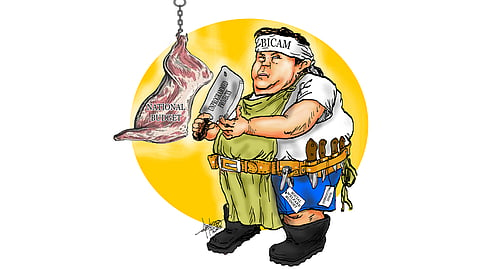
- NEWS
- the EDIT
- COMMENTARY
- BUSINESS
- LIFE
- SHOW
- ACTION
- GLOBAL GOALS
- SNAPS
- DYARYO TIRADA
- MORE

The series of adjustments and appeals that President Ferdinand Marcos Jr. had to make for the 2025 General Appropriations Act and in drafting next year’s budget suggests his disappointment with Congress overstepping its boundaries for the pork barrel.
Mr. Marcos’ most recent appeal was for more funding for the education sector, following the cut in the Department of Education’s (DepEd) budget and the lack of funding for the Technical Education and Skills Development Authority’s (TESDA) programs for 2025.
DepEd officials met with the President to again review the agency’s 2025 budget Thursday, where Marcos emphasized the need to put a premium on the education sector.
Despite a constitutional provision requiring the budget to prioritize education, the Department of Public Works and Highways (DPWH) received the largest allocation among government agencies in the 2025 General Appropriations Act, primarily due to the substantial number of pork barrel insertions.
The President, using his veto power, reduced the DPWH budget to align the GAA with the requirements of the Constitution.
“We have to be able to show that that’s (education) the priority,” Marcos said during his meeting with Education Secretary Sonny Angara.
The manipulation of items in the annual appropriation happened mostly in the bicameral conference committee, which is the final stage in the process before the General Appropriations Bill is sent to Malacañang.
The bicam is composed of members of the Senate and the House of Representatives but the final version of the budget was drafted by a handful of legislators unknown to the public and their work was done behind closed doors.
Since Congress is constitutionally prohibited from increasing the appropriations in the President’s proposed budget, items were either reallocated or placed under unprogrammed appropriations (UAs) which are not computed as part of the budget.
The UAs don’t have definite sources of funding and the Department of Finance was allowed under the 2024 GAA to comb government-owned and -controlled corporations (GOCCs) for excess funds.
The provision was removed in the 2025 GAA but Finance Secretary Ralph Recto issued a directive to all GOCCs to surrender to the National Treasury what the government will identify as idle funds.
In the proposed 2025 budget, think tank Ibon Foundation executive director Sonny Africa said the bicam slashed the provisions for agriculture by a massive P43.2 billion — P20 billion from the agriculture department and P23.2 billion from the National Irrigation Administration (NIA).
The budget that was the output of the bicam was designed to keep food expensive and to worsen rural poverty among farmers and fisherfolk, the independent economist said.
The proof of the pudding is in the eating: misplaced priorities are evident in the performance of the agricultural sector.
Farm productivity, measured by the agricultural output per worker in the sector, has been steeply falling since 2021.
The agriculture sector has only grown by an average of just 0.2 percent quarterly under the current dispensation, or one-sixth of the 1.2 percent average previously.
It is also a fraction of the almost 2.5-percent historical average over the last 25 years based on Ibon’s computation.
Education’s deprioritization has affected all levels of learning from primary to tertiary.
In the bicam version, the DepEd’s budget was slashed by P11.6 billion, the Commission on Higher Education’s by P26.9 billion, and Tesda’s by P1.1 billion. Taken all together these overshadowed the marginal P7.2-billion increase for state universities and colleges (SUCs).
Another bicam victim was health care. The Department of Health (DoH) budget was defunded by P25.8 billion and, as already widely reported and criticized, the PhilHealth subsidy of P74.4 billion was removed, further limiting Filipinos’ access to medicines and hospitalization.
“The bicam cut the budget of the Department of Social Welfare and Development by P95.9 billion. The Pantawid Pamilyang Pilipino Program (4Ps) was cut by a huge P50 billion,” according to Africa.
To make up for the drastic reduction in social support, P26 billion was allocated to the Ayuda para sa Kapos ang Kita Program (AKAP).
AKAP has a vague criteria for doles unlike the targeted 4Ps and it is deeply rooted in patronage politics.
